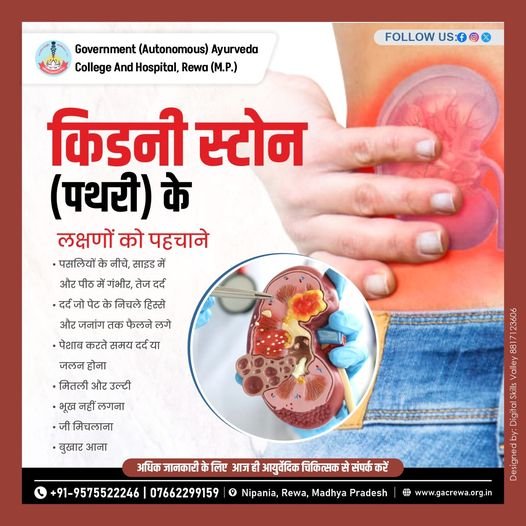Kidney Stones: Symptoms and Ayurvedic Treatment | Government Ayurveda College And Hospital, Rewa (M.P.)
Kidney stones, known as “pathari” in Hindi, are a common health issue affecting numerous individuals globally. These hard deposits made of minerals and salts form inside the kidneys and can cause significant discomfort. The Government (Autonomous) Ayurveda College and Hospital in Rewa, Madhya Pradesh, offers effective Ayurvedic treatments for kidney stones. Let’s delve into the symptoms of kidney stones and how Ayurveda can help in their management and treatment.
Recognizing the Symptoms of Kidney Stones
Kidney stones may not cause symptoms until they move around within the kidney or pass into the ureter. When they do, the following signs and symptoms may occur:
- Severe Pain:
- Pain in the back, side, lower abdomen, and groin area.
- The pain can be intense and come in waves.
- Pain During Urination:
- A burning sensation or sharp pain while urinating.
- Hematuria:
- Pink, red, or brown urine indicating the presence of blood.
- Frequent Urination:
- An increased urge to urinate more often than usual.
- Nausea and Vomiting:
- The severe pain can sometimes be accompanied by nausea and vomiting.
- Cloudy or Foul-Smelling Urine:
- Indicating a possible infection along with stones.
- Fever and Chills:
- If an infection is present.
Ayurvedic Approach to Kidney Stone Management
Ayurveda, the ancient Indian system of medicine, offers holistic and natural remedies for the prevention and treatment of kidney stones. At the Government (Autonomous) Ayurveda College and Hospital in Rewa, patients receive comprehensive care that includes herbal treatments, dietary recommendations, and lifestyle modifications.
- Herbal Remedies:
- Varuna (Crataeva nurvala): Helps in breaking down kidney stones and easing their passage.
- Gokshura (Tribulus terrestris): Known for its diuretic properties, it aids in the expulsion of stones.
- Pashanbheda (Bergenia ligulata): This herb is specifically used for dissolving stones and preventing new ones from forming.
- Punarnava (Boerhavia diffusa): Helps in reducing inflammation and cleansing the urinary tract.
- Dietary Recommendations:
- Increase intake of water to flush out toxins and prevent stone formation.
- Avoid foods high in oxalates such as spinach, beetroot, and nuts.
- Include foods rich in fiber and antioxidants.
- Lifestyle Modifications:
- Regular physical activity to maintain overall health.
- Stress management techniques like yoga and meditation.
- Panchakarma Therapy:
- A detoxification process that helps in cleansing the body and expelling the stones naturally.
Contact Information
For more information and personalized Ayurvedic treatment for kidney stones, you can contact the Government (Autonomous) Ayurveda College and Hospital in Rewa, Madhya Pradesh.
- Phone: +91-9575522246 / 07662299159
- Address: Nipania, Rewa, Madhya Pradesh
- Website: [www.gacrewra.org.in]
Follow Us for Updates and Health Tips:
Conclusion
Kidney stones can be a painful and recurrent condition, but with the right Ayurvedic treatment, their impact can be significantly reduced. The Government (Autonomous) Ayurveda College and Hospital in Rewa provides an excellent blend of traditional Ayurvedic wisdom and modern medical practices to offer relief and promote kidney health. If you’re experiencing symptoms of kidney stones, consider consulting with their experts for a holistic and natural approach to treatment.


